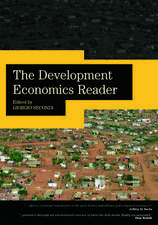Yugoslavia: Socialism, Development and Debt: Routledge Revivals
Autor David A. Dykeren Limba Engleză Paperback – 7 iun 2012
| Toate formatele și edițiile | Preț | Express |
|---|---|---|
| Paperback (1) | 480.62 lei 6-8 săpt. | |
| Taylor & Francis – 7 iun 2012 | 480.62 lei 6-8 săpt. | |
| Hardback (1) | 1058.43 lei 6-8 săpt. | |
| Taylor & Francis – 7 mar 2011 | 1058.43 lei 6-8 săpt. |
Din seria Routledge Revivals
- 9%
 Preț: 801.71 lei
Preț: 801.71 lei - 8%
 Preț: 432.64 lei
Preț: 432.64 lei -
 Preț: 168.89 lei
Preț: 168.89 lei -
 Preț: 245.88 lei
Preț: 245.88 lei -
 Preț: 309.79 lei
Preț: 309.79 lei -
 Preț: 258.73 lei
Preț: 258.73 lei - 9%
 Preț: 764.35 lei
Preț: 764.35 lei - 9%
 Preț: 903.42 lei
Preț: 903.42 lei -
 Preț: 311.18 lei
Preț: 311.18 lei -
 Preț: 357.45 lei
Preț: 357.45 lei - 9%
 Preț: 626.93 lei
Preț: 626.93 lei -
 Preț: 317.54 lei
Preț: 317.54 lei - 9%
 Preț: 764.30 lei
Preț: 764.30 lei -
 Preț: 257.01 lei
Preț: 257.01 lei -
 Preț: 238.40 lei
Preț: 238.40 lei -
 Preț: 259.48 lei
Preț: 259.48 lei - 9%
 Preț: 938.10 lei
Preț: 938.10 lei -
 Preț: 341.33 lei
Preț: 341.33 lei -
 Preț: 264.10 lei
Preț: 264.10 lei -
 Preț: 294.98 lei
Preț: 294.98 lei -
 Preț: 308.89 lei
Preț: 308.89 lei -
 Preț: 207.40 lei
Preț: 207.40 lei -
 Preț: 347.50 lei
Preț: 347.50 lei -
 Preț: 302.59 lei
Preț: 302.59 lei -
 Preț: 389.40 lei
Preț: 389.40 lei -
 Preț: 257.01 lei
Preț: 257.01 lei -
 Preț: 358.30 lei
Preț: 358.30 lei - 9%
 Preț: 640.91 lei
Preț: 640.91 lei - 9%
 Preț: 619.49 lei
Preț: 619.49 lei -
 Preț: 228.88 lei
Preț: 228.88 lei -
 Preț: 265.16 lei
Preț: 265.16 lei -
 Preț: 257.90 lei
Preț: 257.90 lei -
 Preț: 266.06 lei
Preț: 266.06 lei -
 Preț: 258.73 lei
Preț: 258.73 lei -
 Preț: 384.01 lei
Preț: 384.01 lei -
 Preț: 246.38 lei
Preț: 246.38 lei - 9%
 Preț: 832.08 lei
Preț: 832.08 lei -
 Preț: 266.20 lei
Preț: 266.20 lei -
 Preț: 294.53 lei
Preț: 294.53 lei - 18%
 Preț: 695.86 lei
Preț: 695.86 lei - 9%
 Preț: 934.96 lei
Preț: 934.96 lei - 5%
 Preț: 243.38 lei
Preț: 243.38 lei -
 Preț: 274.69 lei
Preț: 274.69 lei -
 Preț: 208.20 lei
Preț: 208.20 lei - 9%
 Preț: 659.19 lei
Preț: 659.19 lei -
 Preț: 259.69 lei
Preț: 259.69 lei - 9%
 Preț: 1038.47 lei
Preț: 1038.47 lei -
 Preț: 389.46 lei
Preț: 389.46 lei -
 Preț: 302.14 lei
Preț: 302.14 lei -
 Preț: 302.27 lei
Preț: 302.27 lei
Preț: 480.62 lei
Nou
Puncte Express: 721
Preț estimativ în valută:
91.100€ • 99.96$ • 77.33£
91.100€ • 99.96$ • 77.33£
Carte tipărită la comandă
Livrare economică 21 aprilie-05 mai
Preluare comenzi: 021 569.72.76
Specificații
ISBN-13: 9780415615693
ISBN-10: 0415615690
Pagini: 218
Dimensiuni: 138 x 216 x 12 mm
Greutate: 0.25 kg
Ediția:1
Editura: Taylor & Francis
Colecția Routledge
Seria Routledge Revivals
Locul publicării:Oxford, United Kingdom
ISBN-10: 0415615690
Pagini: 218
Dimensiuni: 138 x 216 x 12 mm
Greutate: 0.25 kg
Ediția:1
Editura: Taylor & Francis
Colecția Routledge
Seria Routledge Revivals
Locul publicării:Oxford, United Kingdom
Cuprins
1. A young state and a Developing Economy 2. The Origins of Yugoslav Market Socialism 3. The Great Leap Forward: Industrialisation and Extensive Development 1953-65 4. Sysyematic Reform in the 1960s and 1970s: the sovreignty of 'Associated Labour' 5. Growth Strategy and Economic: the Balance of Payments and the Failure of Adjustment Policies in the 1970s 6. The Debt-Service Crisis of 1982 7. Adjustment Policies in the 1980s: Plus ce Change 8. Yugoslavia and the World - an Awkward Customer 9. Politics and the Price of Reform
Descriere
This book, first published in 1990, analyses contemporary Yugoslavian development strategy in its historical and political context, assessing how corruption, negligence, and an emphasis on industry to the detriment of agriculture and trade, have all played a part in bringing Yugoslavia close to financial and political chaos. The book concludes by considering the contemporary prospects for a more integrated policy approach in the midst of the country's political crisis.























